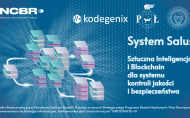Lodz University of Technology is the leader of The Artificial Intelligence and Blockchain for Product Quality and Safety Control System (SALUS) project. The goal is to build a system that will be used to collect and analyze reviews of a range of different types of products. Following from such feedback, potential dual-quality products will be selected, i.e. those that are sold in various European markets under the same brand name, but which differ in quality. Such products will then be subject to laboratory testing.
As dr hab. inż Aneta Poniszewska-Marańda, TUL professor, who heads the project, explained, 'The grant will help build a platform to enable the development of new Artificial Intelligence (AI) solutions'.
The conducted market study revealed that there are legal constraints on the possibility of exploiting the reviews available from popular websites. Consequently, it is necessary to provide a proprietary module to survey users' opinions concerning the quality of selected products. What is innovative about the SALUS system is that it offers a web-based module for continuous and systematic retrieval of opinions, which are then used in the AI component for selecting products for laboratory testing. The new system should reduce the cost of the quality control process and counteract the problem of dual quality of products.
Blockchain and artificial intelligence
The software offered will rely on blockchain technology and artificial intelligence, which provide a number of benefits. Blockchain technology makes it possible to decentralise systems and make them more reliable and secure by distributing the management process. It also allows controlled sharing of data with external parties, which in turn makes it possible to develop autonomous software using the data available on the blockchain. Artificial intelligence mechanisms enable the automation and autonomy of data collection and analysis processes.
SALUS users
The product quality control system is intended for institutions responsible for quality control and consumer protection. It shall help these institutions to collaborate effectively and share the results of their work, thereby enabling better control of product quality, improved consumer awareness, and the development of autonomous solutions relying on artificial intelligence and blockchain technology.
Moreover, as dr hab inż. Aneta Poniszewska - Marańda, emphasises, 'The primary language of the developed solution will be Polish. 'From the user's perspective, it is important to know that SALUS will handle product reviews and data in several languages.’ The primary language of the developed solution will be Polish. However, detection of dual quality issues requires that opinions and data from national but also international sources are examined, so the system will support at least two foreign languages, English and German. This should make it possible to carry out cross-country comparisons and detect possible anomalies..
Currently, the project is in phase I, which is scheduled to have been completed by the end of July 2023.


